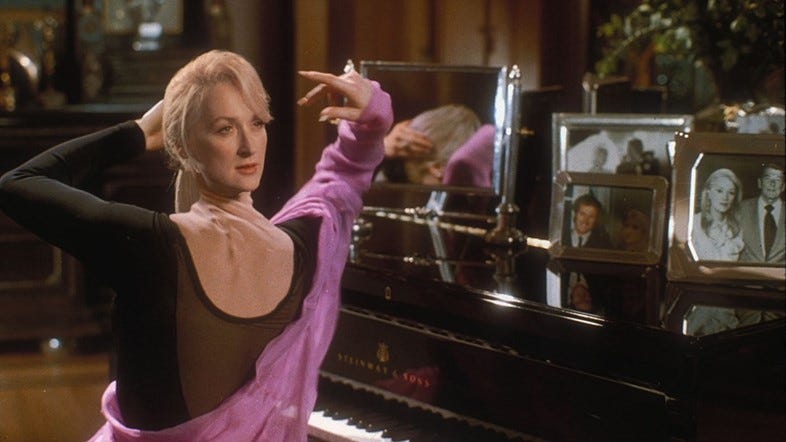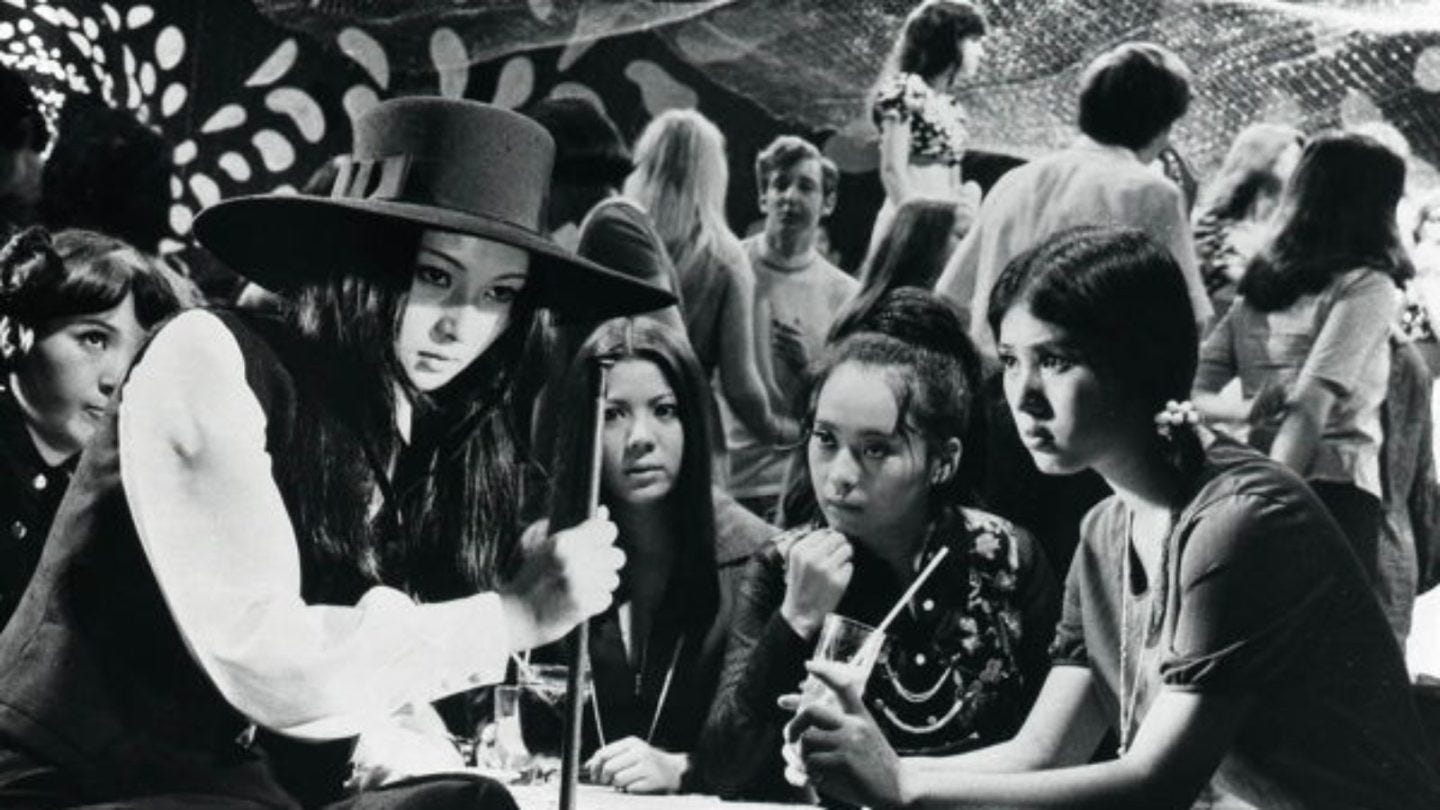#1: Are You Still Watching? 👀
Death Becomes Her, Stray Cat Rock, and horse girl mommy issues in Melancholia vs. Marnie 😈
Death Becomes Her (1992)
I'm so careful that I don't think my body knows how to live, only how to survive. The other night when trying to get the recommended 7-8 hours of sleep, I lay awake thinking about how we're trapped in the same skin and bones since birth, and we just grow and grow until we can't anymore, and then we rot and rot until we can't anymore. I got 4 hours of sleep.
If I knew I'd live forever, I wouldn't treat my body like a temple. I'd put it through hell. Instead, I do burpees in poor form and floss my red gums pink and pluck my eyebrows until I sneeze and squish my chest pimples into scars. It's just different.
Sennah Yee is the author of How Do I Look? (Metatron Press) and My Day With Gong Gong (Annick Press).
delinquent girl lover/s
i want to live in the world of stray cat rock, where a clan of motorcycle-riding delinquent women beat up greasy biker men to the stylized groove of ‘70s youth culture and low-budget attitude. and meiko kaji, leader of the group in most of the five films, wields knives and always glowers. i find it comforting; i crush on meiko because she rarely smiles (don’t smile at me) and could fight me.
i think about women with dark eyes and long dark hair, a doom and gloom, a nowhere tenacity. i often think i could easily live in a world without (straight, cis) men but not everyone else. in the first movie of the series, stray cat rock: delinquent girl boss, an obviously gay-coded ako (akiko wada) rolls into town to save mei (meiko kaji) and her clan from a rival posse of women who—unforgivably—called their lovers, the men, for backup. a singer in real life, akiko’s husky voice backdrops the film, which oozes atmospheric angular images of underpasses, junkyard fields, clubs, and boxing rings. it’s not all peachy keen. like a lot of s/exploitation movies, women are assaulted or tortured. but the stray cats go to rescue their own, whips and weapons and guns, bright blood across cheeks and limbs.
what i love about particular s/exploitation movies is their unashamed depiction of overt dynamics of gender, race, class, and other material realities that happen in the world anyways. sometimes their camp overdone-ness is unexpectedly subversive towards those dynamics (i.e. they come off as satire or ridiculous); sometimes they’re more intentional reversals (like when oppressed groups get the upper hand through violence); sometimes they’re just catharsis to me. i am also enraptured by the aesthetics of women, often leveraged by male directors, but which become something on their own, not put to language by dominant structures (how much of the “canon” depends on a woman’s image, onscreen labour, aura, or existence? how much of “genius” leverages the gaze? archetypically, godard wouldn’t be godard without anna karina). the humble s/exploitation genre makes those dynamics more obvious, of the flesh. the camera on meiko kaji’s cool glare grounds the stray cat rock films, at the same time as existing with other “images” of woman. in delinquent girl boss, the camera performs a pained view of one of the stray cats as she’s tortured by the rival posse, beads of sweat collecting on her face. and while mei (meiko) succumbs to consequences brought on by the man she loves, a resolute ako (akiko) disentangles herself and rides off on her red motorcycle, obscured by goggles and complete with the blaring brass of her song. in my deepest impulses, i also like looking at the women—as much as i have wanted to be like them, the rageful ones. i want to be both of flesh and to enact onto this world.
my favourite outfit of meiko kaji’s is in stray cat rock: sex hunter: oversized black-rimmed hat like in a ‘70s-modern western, white puffed-sleeve shirt, black vest, gold belt buckle, and that look of silent hatred or determination. at a screening of the movie at the royal in toronto, i vaguely dressed like her, in dark green, the wrong colours.
sometimes, in the dead of night, i think,
where do i place my desire? both to love and to exist freely in this femme body.
when i wake up from a long sorrowful slumber, and want,
again.
where do i place it?
the world kept moving on its own all this time:
once on the u-bahn in berlin, i met a woman with long black hair. she looked east asian like me among white passengers on the train. on a very early sunday morning, i was on my way to the airport, and she seemed like she had been out that night and struggling, coming down from or still riding on something. her sadness caught in my bones. circularly, she spoke about how her friends had left her, a lover had been mean, everyone had left, she was alone. she couldn’t seem to figure out how to get home. every so often she got up and spoke to other passengers, who ignored her, one pushing her away with his arm and a look of disdain. it didn’t make sense, for how unthreatening and defeated she was, why no one would even look at her.
she told me the station she needed to get to, a connecting line we had passed, and i gave directions the best i could, seeing her exit through the sliding doors, entombed into the outside world. i got to the end of the line and realized i confused the station for the airport; there was no way i would catch my flight by going back through the metro. i thought of calling a taxi, but didn’t have the number for one or access to internet, and i don’t speak german. in a panic, i scuttled around underground, where one shop was just opening, but the clerk wouldn’t let me use the phone. above, the cobbled streets were completely empty. except—a lone figure, a kindly gray-haired woman who spoke english and felt my nerves buzzing. she generously called a taxi for me in german and i barely made my flight. this moment stays with me for its almost perfect circularity, women upon lost women, a microcosm of meaningful coincidence—and karma, if that exists. like the karma in exploitation movies, sometimes, if they are to be neat endings.
the stray cats’ world circles, too; sometimes meiko dies, to be resurrected again as a differently-named leader in the next film. their lives revolve around the viscous music of the club and temporary, satisfying vengeances. the tough women:
they kill, they fuck and are alive, still—
it’s simple,
say it with me.
we kill, we fuck, and are alive, still.
Joy Xiang (she/her) is a desirous hungry ghost and thinks about where poetry might meet the charged liberation of dancing in dark rooms.
BATTLE OF THE FAVES: Melancholia vs. Marnie
The Editors of In the Mood discuss two of their favourite films. This month: mommy issues, horse girls, and cataclysms.
Gabrielle: So this is the first edition of Battle of the Faves. In one corner, we have Lars von Trier with 2011’s Melancholia, and in the other side of the ring, Alfred Hitchcock with 1964’s Marnie. Or we might say… battle of the blondes!
Sennah: I had written down in my notes, “blonde horse girls with mommy issues.”
Gabrielle: Lol, very true. So Melancholia is your fave, tell me about the first time you saw it.
Sennah: I first saw it with my dad, and I didn’t really like it—I was a bit hangry and nauseous, and excited to go for dinner at Boston Pizza afterwards. It all kind of just went over my head.
Gabrielle: And how was it watching it this time? I imagine you've watched it at least once more since the first time.
Sennah: Yeah! I was going through my first big depressive spell, crying while eating my favourite ramen because I realized it didn’t taste like anything. And suddenly the movie came flooding back for the first time in like, eight years—specifically, what Justine (Kirsten Dunst) says as she tries to eat her favourite meatloaf: “it tastes like ashes.” It was this pathetic, but kind of magical moment. Then I rewatched it at the start of the pandemic, and I felt like I finally “got” it.
Gabrielle: Did it feel different at this age? Like a year or two past your second watch?
Sennah: Yeah, definitely. This time, I was oscillating between relating to everyone—even John (Kiefer Sutherland), who’s just completely fed up with both sisters, and yet still kind of desperately trying to keep everybody happy, until the very end. What was your first viewing of this movie like?
Gabrielle: I went to see it in the theatre alone, which was a good call because I would have wanted to be alone afterwards anyway. I remember going down to the subway platform and no one was there. The world did feel different for a moment, sort of hollowed out and silent. At the time I saw valour in Justine’s stance because I also had periods when I was completely paralyzed by despair. I think there is a desire to reframe the stasis and retreat of depression into something intentional, philosophical even.
Watching it now, it's nice because to feel that I relate more to Claire, I’m actually very attached to my life and the bourgeois trappings of relationships, friends, careers, nice homes. When Claire suggests that they have a glass of wine on the terrace as the world ends, I felt that!
Sennah: Ha, totally! I know Justine totally tears her apart for wanting that, but I’m like… hm, kinda sounds nice lol.
Gabrielle: I read some old reviews of the film and they were interesting. Most of them praised the film’s aesthetic and technical merits (particularly the opening sequence) but felt that it was philosophically shallow and emotionally unconvincing. One critic said that the whole first half of the movie, the wedding and her breakdown, was preposterous; that no one’s reactions or actions made sense. I mean, clearly, you haven’t been around enough chaotic young women because there’s literally nothing Justine does I haven't seen or heard a friend do.
Sennah: Totally! As grandiose as the movie was, I thought it was really realistic in how it treats depression, specifically in how it’s a really weird balance of like, you don’t want anyone’s attention, and yet your depression causes the complete opposite.
Gabrielle: Absolutely. Another review critiqued the film for treating depression like a “princess problem,” and I actually love that. I think Justine is treated like a princess, both because she’s entitled and mercurial and because we’ve invested an idea of perfection and privilege in her. I think it’s more interesting that von Trier would choose her as a cypher for his own experience of depression. He does love a female lead! But this choice feels like it’s revealing his own impulses and desires.
I wonder if, in the depths of depression, he thought that his suffering would be more poignant if he were a beautiful blonde bride and not a middle-aged man; if he could turn his despair into beauty. I think, in the same way, the film is trying to reframe depression. Not as something clinical, chemical, to be fixed, but something that sets you apart bestows you with a kind of clairvoyance and aligns with the very romantic notions of truth and beauty.
Sennah: Totally. And there are so many indulgent scenes. Like when Justine’s in the bath during her wedding. I love when Michael realizes that both Justine and her mom are both taking baths, and he’s like, “I told you that’s why we shouldn’t have added bathrooms to our guest suites!”
Gabrielle: I love that moment as well. All the men in the film are completely impotent, even before being rendered completely impotent by the cataclysm. Maybe that’s another peek into von Trier’s inner world.
🐴 Read The Full Piece Here →
Feeling Chaotic? Liz Bowen recommends Bacurau (2019)
“A grindhouse-stylized class war emerges from the town’s quietly utopian roots, where queerness and harm reduction are as mundane as the local DJ’s amateur broadcasts. By the time a revolutionary genderqueer gang leader (a messianic performance by drag artist and activist Silvero Pereira) comes through to save the town from a techno-terrorist hunting game run by rich European and U.S. serial killers, it’s hard to tell if you’re watching a video game, a horror film, a Western, or a dream.”










